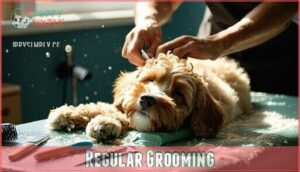This site is supported by our readers. We may earn a commission, at no cost to you, if you purchase through links.
 A Goldendoodle is a mix of a Golden Retriever and a Poodle, bringing together smarts, hypoallergenic coats, and a goofy charm.
A Goldendoodle is a mix of a Golden Retriever and a Poodle, bringing together smarts, hypoallergenic coats, and a goofy charm.
These pups come in various sizes—mini, medium, or standard—so there’s likely one that fits your lifestyle.
Their coats can range from wavy to curly, and while they shed less, they do need regular grooming.
Goldendoodles tend to be friendly, making them perfect for families, though they thrive on attention and exercise.
They’re quick learners but can be a little mischievous if bored, and are always curious about their surroundings, and curious about keeping yours healthy and happy? There’s more to explore about this adorable hybrid.
Table Of Contents
- Key Takeaways
- Goldendoodle Overview
- Goldendoodle Temperament
- Goldendoodle Health Issues
- Finding Goldendoodle Companions
- Goldendoodle Care Essentials
- Frequently Asked Questions (FAQs)
- How much does a Goldendoodle cost?
- Is a Goldendoodle a high maintenance dog?
- Do Goldendoodle dogs shed a lot?
- How much do Goldendoodles cost?
- Are Goldendoodles good family pets?
- How big do Goldendoodles get?
- Are Goldendoodles hypoallergenic?
- Does a Goldendoodle require a lot of exercise?
- What activities are ideal for Goldendoodle puppies?
- How do Goldendoodles handle long workday separations?
- Conclusion
Key Takeaways
- Goldendoodles are a mix of a Golden Retriever and a Poodle, offering intelligence, friendly temperaments, and low-shedding coats that make them great for families.
- They come in three sizes (miniature, medium, and standard) and have varying coat types from wavy to curly, which require regular grooming.
- Proper care includes daily exercise, consistent training, and early socialization to keep them happy, healthy, and well-behaved.
- While they’re not completely hypoallergenic, their Poodle genes mean less shedding, which can help manage allergens for sensitive owners with friendly temperaments.
Goldendoodle Overview
You’ll find Goldendoodles come in three sizes (miniature, medium, and standard) and feature coats ranging from shaggy to curly, requiring regular brushing.
This popular crossbreed between Golden Retrievers and Poodles inherits intelligence and social traits from both parent breeds, making them excellent family companions, with social traits that make them a great fit.
Breed Characteristics
Ever wondered what makes Goldendoodles so special?
These designer dogs are a crossbreed between Golden Retrievers and Poodles, combining the best traits of both parents.
Goldendoodles blend Golden Retriever love with Poodle smarts, creating the perfect mix of affection, loyalty, and brilliance.
Their genetic influence creates a unique blend of intelligence, friendliness, and loyalty.
You’ll find their aesthetic appeal lies in their expressive eyes and joyful demeanor.
Doodle generations vary in traits due to crossbreed unpredictability, but their soaring popularity speaks to their winning temperament and adaptable nature.
Size Variations
You’ll find Goldendoodles in three distinct size categories determined by their Poodle parent.
Miniature Size Goldendoodles weigh 15-30 pounds, perfect for apartment living. Medium Size varieties range from 30-45 pounds, offering a balanced option.
Standard Size Goldendoodles can reach 45-100+ pounds—quite the lapdog! Growth factors and size genetics aren’t always predictable, so your mini goldendoodle puppy might surprise you by growing larger than expected, which can be an unexpected surprise.
Coat Types
Your Goldendoodle’s coat won’t match another’s, thanks to their varied genetic makeup.
You’ll find three main fur types: straight (like Golden Retrievers), wavy (a perfect blend), and curly (Poodle-dominant).
Each requires different grooming needs—curly coats need daily brushing while straight coats shed more.
This poodle mix isn’t truly non-shedding, but curly-coated goldendoodles produce fewer allergens, making them better for allergy concerns.
Color Options
The palette of your goldendoodle companion extends far beyond what many prospective owners realize.
Thanks to coat genetics from both Poodle and Golden Retriever parents, you’ll find surprising variety.
Here are 5 color options that make goldendoodles unique:
- Cream (most popular)
- Apricot (tends to fade with age)
- Red (rarer, highly sought-after)
- Black (often glossy)
- Parti Goldendoodles (two distinct colors)
Goldendoodle Temperament
You’ll find that Goldendoodles combine the friendly nature of Golden Retrievers with the intelligence of Poodles, creating a dog that’s both affectionate and smart.
Combining affectionate charm with poodle-level smarts, Goldendoodles quickly become the heart of any family with their lovable and clever nature.
These designer dogs typically show devotion to their families and respond well to positive training methods, making them excellent companions for households with children.
Intelligence Level
You’ve heard about their cute looks, but their brains will truly amaze you.
Your Goldendoodle’s intelligence level ranks among the top dog breeds.
| Intelligence Type | Rating | What It Means |
|---|---|---|
| Problem-solving skills | ★★★★☆ | Figures out puzzle toys quickly |
| Learning speed | ★★★★★ | Masters new commands in under 5 repetitions |
| Task comprehension | ★★★★☆ | Understands complex multi-step commands |
| Trainability ease | ★★★★★ | Catches on faster than most breeds |
| Cognitive abilities | ★★★★☆ | Remembers words and routines impressively |
They have exceptional problem-solving skills and learning speed, making them highly trainable.
Social Behavior
A Goldendoodle’s social behavior shines with proper dog socialization.
They thrive on dog park visits, bonding with other pets and children.
However, their dog temperament can shift without interaction, leading to separation anxiety.
Early dog training and behavior management help them adapt.
These affectionate dogs love being part of the action, making socialization importance key to their happiness.
Owners should also consider that they can be a great family pet.
Family Role
In the role of being a family dog, Goldendoodles shine.
Their goldendoodle temperament blends affection and emotional support, making them perfect for home integration.
They’re adaptable to different activity levels, whether it’s playtime with kids or quiet moments.
Known for child companionship, they’re one of the best dog breeds for families.
These loyal dogs thrive on love and connection.
Training Methods
Training your Goldendoodle is all about patience and using positive reinforcement.
Praise, treats, and play work wonders for teaching leash manners or recall training.
Crate training helps with structure, while agility training keeps them sharp and engaged.
Goldendoodles thrive on consistency, so stick to clear dog training techniques.
With the right approach, dog behavior management becomes a breeze!
Goldendoodle Health Issues
Goldendoodles can face health issues inherited from their Golden Retriever and Poodle parents, like hip dysplasia or ear infections.
Understanding these risks helps you keep your furry friend healthy and happy.
Common Health Problems
Goldendoodle health can be tricky, with these common issues to watch for:
- Hip Dysplasia: It causes pain and mobility issues.
To address this, consider products for support.
- Ear Infections: Keep ears clean to prevent problems.
- Progressive Atrophy: This leads to gradual vision loss.
- Bloat Risk: A life-threatening digestive issue.
- Cancer Rates: Some inherit increased risks from their parents. Regular checkups matter!
Genetic Diversity
Goldendoodles benefit from Hybrid Vigor, meaning their diverse dog ancestry can reduce some inherited health risks.
However, dog genetics aren’t predictable, and Trait Variation happens.
Genetic Testing helps guarantee healthier puppies by screening for issues tied to dog breed genetics. A dog DNA test can help determine breed mix.
While Breed Purity isn’t a focus, diversity counters the Founder Effect, promoting stronger, healthier goldendoodle generations.
Obesity Prevention
Keeping your pup active is a fun way to tackle goldendoodle health issues like obesity.
Combine an exercise regimen with these tips:
- Calorie control: Stick to recommended portion sizes.
- Healthy treats: Swap high-calorie snacks for veggies.
- Dog food puzzles: Make mealtime engaging and slower.
- Weight monitoring: Regularly check their weight to stay on track.
These puzzles provide stimulating mental enrichment during feeding.
Balanced play and proper feeding keep your Goldendoodle thriving!
Regular Grooming
Tackling dog grooming for your Goldendoodle? Regular coat brushing keeps tangles away, while professional clipping every 8-12 weeks maintains their look.
Don’t skip ear cleaning—those floppy ears trap moisture. Nail trimming prevents discomfort, and dental hygiene, like daily brushing, avoids costly vet visits.
Straight hair Goldendoodles often require less grooming than their curly counterparts. Goldendoodle grooming isn’t just upkeep; it’s essential dog care that keeps your pup healthy and happy.
Finding Goldendoodle Companions
Finding the right Goldendoodle companion takes research and a bit of patience.
Whether you choose a breeder, rescue group, or adoption site, knowing what to look for guarantees a happy match.
Reputable Breeders
A reputable breeder guarantees health guarantees and performs genetic testing to avoid inherited issues.
They prioritize breeder ethics, offering well-socialized puppies raised in loving environments.
Avoid puppy mills, as they often neglect proper care.
Goldendoodle breeders like Fox Creek Farm and Windsong Doodles excel in health testing and socialization practices, making dog breeder selection easier for finding a healthy, happy companion.
Rescue Groups
Rescue groups offer a second chance for Goldendoodles needing loving homes.
They’re great for finding senior Goldendoodles or those with specific medical needs.
Benefits include:
- Lower adoption fees than breeders.
- Detailed health and behavior insights.
- Opportunities to foster Goldendoodles before committing.
- Supporting dog rescue organizations.
Adoption challenges like adjusting to past trauma may arise, but patience makes it rewarding.
Adoption Process
Goldendoodle adoption through shelters or dog rescue organizations often starts with shelter screening and paperwork details.
Adoption fees vary, so ask upfront. Some groups require a home visit or offer a trial period to confirm the fit.
Dog shelter adoption can be rewarding, but understanding the dog adoption process helps. Adoption organizations often provide health and temperament insights for smoother passages.
New owners should be aware of the phases of a rescue dog to ease the adjustment.
Goldendoodle Care Essentials
Caring for a Goldendoodle means staying on top of their exercise, grooming, and social needs.
With the right attention, you’ll keep your pup happy, healthy, and ready to charm everyone they meet.
Exercise Needs
Once you’ve found your Goldendoodle, keeping up with their energy level is key.
Daily activity like walks, fetch, or trips to the dog park helps burn off energy. Mental stimulation is just as important—puzzle toys or training games work wonders.
Puppies need short, frequent exercise bursts, while seniors benefit from gentler activities to match their slower pace.
These dogs benefit from activities that highlight their athletic bodies and skills, which is crucial for their overall well-being and to utilize their athletic abilities.
Feeding Requirements
Feeding your Goldendoodle isn’t one-size-fits-all. Calorie intake depends on age, size, and activity. Puppies thrive on frequent meals, while senior nutrition focuses on joint-friendly formulas.
Watch for food allergies or dog food guarding behaviors.
- **Stick to measured portions for weight management.
- **Choose AAFCO-compliant food for balanced dog health.
- **Avoid exercise right before or after meals.
Grooming Techniques
Though a goldendoodle’s hypoallergenic coat is a charm, grooming is essential.
Regular coat brushing prevents tangles, while professional clipping every 8-12 weeks keeps their look tidy.
Ear cleaning helps avoid infections, especially for this non-shedding dog.
Don’t skip nail trimming or dental hygiene—healthy paws and teeth matter.
| Task | Frequency | Tools Needed | Why It’s Important |
|---|---|---|---|
| Coat Brushing | Every other day | Slicker brush | Prevents mats and tangles |
| Professional Clipping | Every 8-12 weeks | Grooming shears | Maintains coat health and style |
| Ear Cleaning | Weekly | Dog-safe ear cleaner | Prevents painful infections |
| Nail Trimming | Monthly | Nail clippers | Avoids discomfort and overgrowth |
The table outlines the necessary tasks for maintaining a goldendoodle’s health and appearance, including coat brushing, ear cleaning, and professional clipping.
Socialization Tips
After grooming your goldendoodle, focus on socialization to shape their behavior.
Start early with Puppy Exposure to new sights and sounds.
Use these tips:
- Introduce Positive Associations with treats during new experiences.
- Visit Dog Parks for playful interactions.
- Teach Social Cues like calm greetings.
- Gradually address fears for Fear Mitigation.
- Schedule puppy playdates for balanced training.
Socialization builds confidence!
Frequently Asked Questions (FAQs)
How much does a Goldendoodle cost?
Goldendoodle prices vary, typically ranging from $1,500 to $3,000 when bought from reputable breeders. Adoption fees at shelters or rescues are usually much lower, often under $500, making them a budget-friendly choice.
Is a Goldendoodle a high maintenance dog?
Yes, Goldendoodles can be high maintenance.
Their coat needs regular brushing to prevent tangles, professional grooming every 8-12 weeks, and consistent care for ears, nails, and teeth.
Their social, active nature also requires daily attention.
Do Goldendoodle dogs shed a lot?
You might think shedding is unavoidable, but Goldendoodles shed minimally—thanks to their Poodle genes.
Their coats range from wavy to curly, trapping loose fur.
Regular brushing keeps stray hairs in check while managing tangles, which helps maintain their coats.
How much do Goldendoodles cost?
You’ll spend $1,500 to $5,000 for a Goldendoodle, depending on size, breeder reputation, and location. Adoption costs less, around $300-$ High-quality breeders often include health guarantees, so research thoroughly before buying!
Are Goldendoodles good family pets?
Picture a loyal, playful buddy wagging their tail as your kids laugh.
They’re intelligent, affectionate, and good with children.
With early socialization and training, they thrive in families and adore being part of your world.
How big do Goldendoodles get?
Goldendoodles come in three sizes.
Miniatures weigh 15-30 pounds, mediums reach 30-45 pounds, and standards range from 45 to over 100 pounds.
Their size depends on genetics, so there’s always a bit of variety!
Are Goldendoodles hypoallergenic?
You’re probably hoping for a definitive yes, but no dog is truly hypoallergenic.
Goldendoodles shed less, thanks to their Poodle genes, which many allergy sufferers find manageable.
Regular grooming helps keep allergens under control.
Does a Goldendoodle require a lot of exercise?
A Goldendoodle does well with daily exercise like walks, playtime, or backyard zoomies.
They’re active but not overwhelming, making them a great fit for families.
Keep them engaged to avoid boredom-induced mischief!
What activities are ideal for Goldendoodle puppies?
Take your pup on short walks, play tug-of-war, or try fetch with soft toys.
Mental games like treat-filled puzzles or basic obedience training also keep them engaged.
Just keep activities short to match their energy, and consider complete concepts like these to ensure your pup stays happy and healthy.
How do Goldendoodles handle long workday separations?
Long workdays can be tough on any dog.
To keep your pup happy, leave toys, puzzles, or treat dispensers to entertain them.
Consider doggy daycare or a midday walker if they need extra attention.
Conclusion
Owning a Goldendoodle is like adding a splash of sunshine to your life.
Their intelligence, friendly temperament, and low-shedding coats make them a joy, but they do come with responsibilities.
From regular grooming to daily exercise, they thrive when cared for properly.
Understanding their unique needs guarantees you’ll have a happy, healthy companion.
Whether you’re drawn to their playful energy or their loyal nature, a Goldendoodle can easily become your family’s perfect match.

















